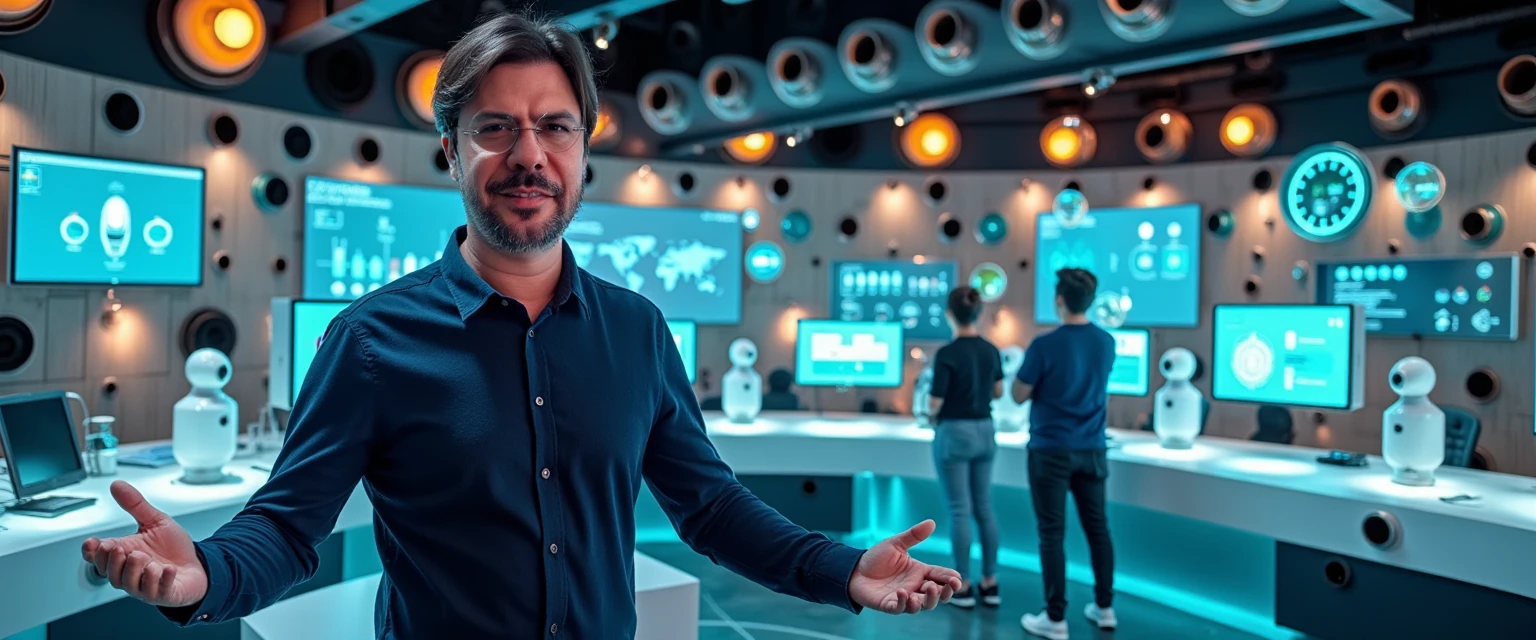AI Radar in Brazil: From the Legal Revolution to Gemma 3 – What happened in the last 24 hours
March 16, 2025 | by Matos AI

The world of artificial intelligence never ceases to amaze us. While Brazilian startups achieve impressive results, large technology companies launch new open models, and issues of ethics and diversity gain increasing relevance in the public debate. As I always do in this daily section of the blog, we will analyze the main AI news of the last 24 hours and what they mean for entrepreneurs, startups and the innovation ecosystem in Brazil.
Brazilian Legaltech Reaches R$10 Million in Revenue Milestone
One of the most important highlights comes from the legal sector. Legal IA achieved the R$10 million milestone in annual recurring revenue in Q1 2025, representing extraordinary growth of R$3,000 compared to the previous year. According to Veja report, the company already serves 9 thousand law firms, impacting the work of approximately 140 thousand Brazilian lawyers.
This case demonstrates a pattern I have observed in recent years: vertically integrated AI solutions focused on solving specific industry problems have greater potential for accelerated growth than generic tools. Juridico IA has found its niche by developing a technology that understands the nuances of Brazilian law and generates ready-to-use legal texts, saving valuable time in drafting challenges, replies and appeals.
Join my WhatsApp groups! Daily updates with the most relevant news in the AI world and a vibrant community!
- AI for Business: focused on business and strategy.
- AI Builders: with a more technical and hands-on approach.
For entrepreneurs thinking about developing AI solutions, this case offers a crucial lesson: deeply understand your customer's pain and build a solution that doesn’t just use AI as a buzzword, but actually transforms processes and generates measurable efficiencies.
Google Launches Gemma 3: Multilingual Open Source AI
In the field of big players, Google announced the launch of Gemma 3, a new generation of its open source language model. According to the Brazilian Post Office, this version brings significant advances, including multimodal capabilities that allow identifying text and images, as well as analyzing short videos.
What caught my attention most about this launch was the accessibility of the model: support for 140 languages, optimization to run on Nvidia and AMD GPUs, and the absence of API charges. This move by Google represents a trend that I have been following for some time: the democratization of access to high-performance AI models.
For the Brazilian startup ecosystem, this means that even companies with limited resources can develop advanced AI-based solutions. The barrier to entry for creating applications that process natural language, recognize images and analyze videos is increasingly lower.
When AI Says “No”: The Case of Cursor AI
A curious and provocative case was reported by The Globe: Cursor AI, an AI-based programming tool, refused to generate more code after 800 lines, suggesting that the programmer develop the logic on their own to avoid dependency.
This case raises fascinating questions about the limits of AIs and their role in human learning. Are we heading towards a scenario where AIs themselves establish ethical limits in their relationships with their users? Or is it just a matter of technical limitations disguised as pedagogical concerns?
In my experience working with technology startups, I have observed an interesting paradox: while we seek to automate processes with AI to gain efficiency, we need to be careful not to create dependencies that atrophy our creative and analytical capabilities. Tools should enhance us, not replace us.
10 AI Myths to Abandon by 2025
Other relevant content was published by Medium and Message, discussing common myths about artificial intelligence that we should abandon by 2025. The article addresses misconceptions, such as the idea that AI can completely replace humans in all roles or that its development is free from bias.
This kind of thinking is essential to avoid both the naive techno-optimism and the apocalyptic pessimism that often dominate discussions about AI. In my work with startups and corporations, I always emphasize the importance of a balanced view: AI is a powerful tool, but its effectiveness depends on the quality of the data, the algorithms, and, most importantly, the human intentions behind its development.
Diversity in Technology: A Brazilian's Warning at Microsoft
A particularly important topic was raised by Gabriela de Queiroz, Microsoft's director of artificial intelligence. According to a report by S.Paulo Newspaper, she expressed concerns about big tech companies backtracking on their diversity, equity, and inclusion (DEI) policies.
As someone who has always advocated for diversity in the Brazilian startup ecosystem, I completely agree with Gabriela. Diverse teams are not just a matter of social justice – they produce better business outcomes. When we build teams with different perspectives, experiences, and backgrounds, we create more comprehensive solutions and avoid the algorithmic biases that so concern AI ethicists.
In my acceleration and mentoring programs, I always encourage founders to build diverse teams from the beginning, as this becomes a competitive advantage as the company grows.
The Super AI Horizon: Closer Than We Think?
THE State published an interesting analysis on three reasons to believe that a super AI is near, suggesting that very soon – probably in 2026 or 2027 – one or more companies will claim to have created an artificial general intelligence (AGI).
This discussion of artificial superintelligence always provokes deep reflection in me. On the one hand, the pace of progress has been extraordinary. On the other, I’ve seen previous cycles of inflated expectations followed by “AI winters.” The truth probably lies somewhere in between: we’ll continue to see significant advances in specific capabilities, but full-fledged AGI will still face considerable conceptual and technical challenges.
What I recommend to entrepreneurs is to stay up to date on these advances, but focus on practical, specific applications of AI that solve real problems for their customers, rather than chasing the distant promise of generalist superintelligence.
DeepSeek and the Global Race for AI
A piece of news that deserves special attention comes from China: according to the Earth, Chinese startup DeepSeek has outperformed established Western AI models like ChatGPT, with significantly lower operating costs.
This development illustrates the fierce technological race between the US and China, raising important questions about control and ethics in the development of AI. For us Brazilians, this scenario presents both a challenge and an opportunity: how do we position ourselves in this global dispute? Will we simply be consumers of these technologies or will we be able to develop our own capabilities and approaches to AI?
In my view, countries like Brazil urgently need coordinated public policies and private investments to develop local AI capabilities. Otherwise, we risk further increasing our technological dependence.
McDonald's Bets on AI for Loyalty
In the field of commercial application, the CartaCapital reported that McDonald's has decided to implement AI-driven processes to improve the consumer experience and increase customer loyalty. The strategy includes facial recognition and personalized data integrated into the operation.
This case exemplifies a growing trend of traditional companies adopting AI to transform the customer experience. It’s interesting to see how a century-old company like McDonald’s is incorporating advanced technologies to stay competitive.
For Brazilian companies that are still hesitant to adopt AI solutions, this is a wake-up call: digital transformation is no longer an option, but a necessity for survival in today’s market. In my consulting sessions, I often emphasize that the question is no longer “if” a company should adopt AI, but “how” and “when.”
Perspectives and Opportunities
Analyzing the news from the last 24 hours, I identify some trends and opportunities for the Brazilian innovation ecosystem:
- Verticalized solutions will continue to stand out: As we saw in the case of Juridico IA, tools that solve specific problems in a sector have great potential for adoption and growth.
- Democratization of advanced tools: With the launch of models like the Gemma 3, Brazilian startups will have access to cutting-edge technologies at affordable costs.
- Ethics and responsibility will be competitive advantages: Companies that develop AI ethically and with diverse teams will have an advantage in attracting customers and talent.
- The global race for AI leadership demands strategic positioning: Brazil needs to define in which niches it can be globally competitive.
Conclusion: What to do now?
For entrepreneurs and innovation leaders in Brazil, I suggest three concrete actions in light of the current scenario:
1. Try out the new tools: Test Gemma 3 and other open models to understand their capabilities and limitations before deciding to incorporate them into your products.
2. Invest in diversity: Build heterogeneous teams that can analyze problems from different perspectives, minimizing biases in your AI solutions.
3. Focus on specific problems: Instead of trying to create the next AGI, focus on solving real, well-defined pain points for your customers using AI as a tool.
In my mentoring sessions with startups, I have observed that companies that follow these principles are able to evolve more quickly and sustainably in the competitive technology market. If you are facing challenges in implementing AI in your business or want to discuss specific opportunities for your company or sector, feel free to contact me.
Brazil has the talent and creativity to stand out in this technological revolution. We just need focus, collaboration and a clear strategic vision to transform potential into concrete results.
✨Did you like it? You can sign up to receive 10K Digital's newsletters in your email, curated by me, with the best content about AI and business.
➡️ Join the 10K Community here
RELATED POSTS
View all



